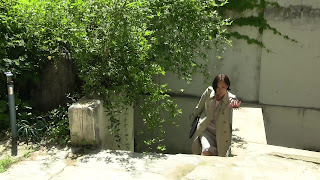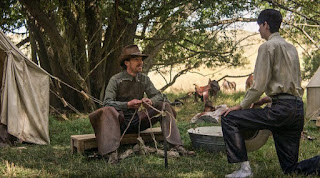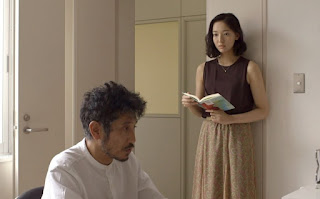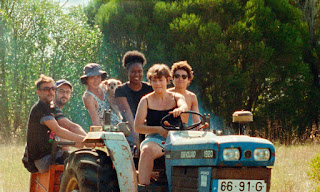Combining the ordinary and every day with the utterly fantastic, Georgian director Koberidze introduces a productive dissonance that finds the fairytale, through omniscient narration, embedded deep in the real (of a very specific time—in the midst of World Cup madness—and place). Free, playful, and apologetically escapist from a moment we’d all like to flee.
2. In Front of Your Face (Hong Sang-soo, South Korea)
For feature twenty-six, Hong uses one of his simplest structures of replication—days one and two—to tell the story of a former actress whose return to Korea follows devastating health news (and coincides with a potential job offer). The resplendent Lee Hye-young overwhelms in this oversaturated exploration of grace—and variation on film twenty-five, Introduction.
3. Drive My Car (Ryûsuke Hamaguchi, Japan)
Drive My Car is the film where it all seems to come together for Hamaguchi. Adapting a Murakami short story of the same name, the director’s three-hour opus pulls equally from Chekhov, the subject of the play-within-the-film (which foregrounds the filmmaker’s unique method of rehearsing actors). Exquisitely crafted, emotionally resonant, and big in its impact.
4. The Power of the Dog (Jane Campion, United Kingdom / Canada / Australia / New Zealand / United States)
One of the greatest figures of the 1990s art house returns to Netflix—in a sign of the times—for her first feature in more than a decade. Displaying a Fordian compositional grace and late-classical storytelling, Campion’s queer take on hetero male values in the Old West transforms Kodi Smit-McPhee’s extraordinarily slim physique and slight manner into a site for spectacle.
5. Wheel of Fortune and Fantasy (Ryûsuke Hamaguchi, Japan)
Confirmation that it is the year of Hamaguchi—he also wrote the screenplay for Kiyoshi Kurosawa’s astonishing, 2021 commercial release Wife of a Spy—this three-part anthology makes expert use of the Japanese director’s great facility for the erotic and a set of surprising narrative turns. Time passes whether it’s marked by a belated reunion, the reading of an explicit passage or a long conversation.
6. Il Buco (Michelangelo Frammartino, Italy / France / Germany)
The Le Quattro Volte's director's first feature in more than a decade, Il Buco plunges hundreds of meters below the earth's surface, recreating the 1961 discovery of Southern Italy's deepest cave. Frammartino moves along specular verticals, up the side of skyscraper and with a shepherd into the Calabrian highlands and into breathtaking cavernous depths in this poetic exploration of emergent modernity.
7. Memoria (Apichatpong Weerasethakul, Colombia / Thailand / France / Germany / Mexico / Qatar / United Kingdom / China / Switzerland)
Making extraordinary use of his surveillance camera and a piercingly metallic soundtrack, Memoria follows one of the world’s great directors to Colombia for his latest audio-visual immersion. With his shift away from Thailand, Apichatpong’s art becomes more conventionally surreal, creating a landscape that more fully belongs to dream and the cinema than to Thai history or myth.
8. The Girl and the Spider (Ramon Zürcher and Silvan Zürcher, Switzerland)
No one quite tells a “story” like the Zürcher brothers. Penetrating glances do the heavy lifting in a series of shifting interactions that are latently erotic, violent or both. More comic than dramatic in tone, the action unfolds mostly indoors—just as it did in Ramon’s The Strange Little Cat—as one of the principal’s packs up and moves with the help of family, friends, and a compelling ex.
9. Ahed’s Knee (Nadav Lapid, France / Israel / Germany)
A goodbye to mothers—to Lapid’s own late collaborator mother and to his Israeli motherland—Ahed’s Knee plays with his surrogate’s ambiguous motivations and the palpable romantic chemistry he shares with outstanding newcomer Nur Fibak, up to the point where it’s time for his goodbye. An explosive denunciation of Israel ensues in this scalding Synonyms follow-up.
10. The Tsugua Diaries (Maureen Fazendeiro and Miguel Gomes, Portugal / France)
Moving from end to beginning in a spiritual sequel to Gomes’s breakthrough Our Beloved Month of August (2008)—“tsugua” is “august” in reverse, naturally—the co-director and his filmmaking partner Fazendeiro introduce a structure that emphasizes the collaborative labor underlying their production. COVID also emerges as a context in this experimental fiction-documentary hybrid.










No comments:
Post a Comment